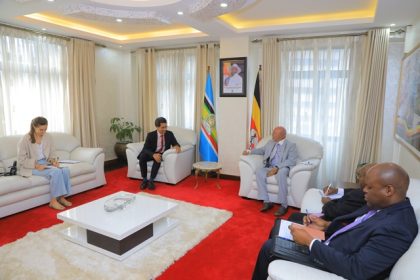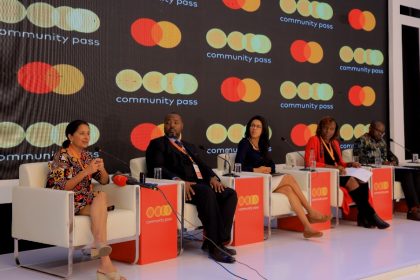Three emerge winners in post-Covid education applications contest
 Samantha Namara (left) calms nerves as one of the teams prepares to pitch their solution during in the Future of Education accelerator program.
Samantha Namara (left) calms nerves as one of the teams prepares to pitch their solution during in the Future of Education accelerator program.
Out of 87 entrants, three start-ups have emerged as the most promising in developing digital applications to complement changing teaching-aid techniques in light of the coronavirus pandemic.
As participants of the Edtech Lab, KAINOafrica, ThinkPlay and Nimarungi were recently selected in the Future of education accelerator program hosted by The Innovation Village and supported by Mastercard Foundation Young Africa Works together with Arizona State University.
Uganda, like many other countries around the world, has been grappling with the effects of the pandemic. Educational institutions were directed to close while the government drafted new standard operating procedures (SOPs) to counter the spread of the disease. Currently, a phased opening has been taking place beginning with candidate students late last year before a full scale return to classes starts next month.
The Future of Education is a business development program implemented by The Innovation Village through its Education Technology Lab supported by Mastercard Foundation and the Arizona State University. It provides holistic support to innovative businesses rethinking and shaping the Future of Education.
CK Japheth, The Innovation Team Lead said, “Our aim is to fill the gap created by Covid-19 effects with ideas and innovations to lead to transformative change in the education sector. For eight intensive weeks Uganda’s most promising education entrepreneurs received expert guidance on how to navigate the education landscape and scale their solutions via mentorship, peer learning and expert feedback. After this accelerator program, we can gladly say we have potential and promising solutions if nurtured well.”
The 87 applications were whittled down to 10 who pitched to a panel of judges who selected the top three. The three start-ups will receive exposure to investors and expert guidance on how to navigate the education landscape and scale their solutions via mentorship, peer learning, guidance from experts and implementing partners.
Rita Laura Lulua, Lead Education and Skills at Mastercard Foundation said, “The responses have also highlighted existing gaps and disparities, the digital one inclusive. Learning losses due to prolonged school closures means that many educational outcomes are at risk. For a number of reasons, we cannot return to the world as it was before, and stakeholders need to ensure that education systems are more flexible, equitable, and inclusive.”
KAINOafrica is an easy-to-use tool that offers premium STEM blended curriculum-aligned early childhood education content to parents for homeschooling their children and teachers in ECD centers in form of lesson guides, which they can use to deliver daily curriculum-aligned lessons to their children using our web and mobile apps.
ThinkPlay makes board games-for-rent to help children learn math and science through play sessions with peers and family. The board games are used as a cost-effective instructional material integrated into a set of game-based learning strategies to offer a conducive, safe, and fun learning environment that increases motivation and interest for learning.
Nimarungi is solving the problem of education inequality caused by a lack of data leading to uninformed decisions and policies affecting the marginalized youths and children. This is done by collecting data with the use of Open Data Kit (ODK) which is a free open source, accurate, quick, offline, and at scale data collection tool. This data is analyzed and expressed as a response to stakeholders. Nimarungi advises stakeholders on the areas that need more focus, then it proposes for the redirection of funds to the right people which in the end influences informed decision making and policies.
Samantha Namara, Senior Associate FutureLab at The Innovation Village said, “For the past four months we run a program which was highly selective and intensive for Uganda’s most promising education entrepreneurs. We were impressed by the innovations out there and the commitment to improve these ideas among the start-ups. This is what The Innovation Village is about. Reimagining and reinventing solutions to challenges with the ability to transform ideas and turn them into assets. We believe the ideas selected stand a real chance to meet the sector’s needs.”

 African Heads of state head to South Korea next week for Summit talks
African Heads of state head to South Korea next week for Summit talks
 Trading leads as main source of income for Ugandans
Trading leads as main source of income for Ugandans
 Uganda-Tanzania announce date for second joint business forum
Uganda-Tanzania announce date for second joint business forum
 Women social entrepreneurs offered chance to visit New York
Women social entrepreneurs offered chance to visit New York
 With eyes on oil and gas, France pledges USD 3 billion investment in Uganda
With eyes on oil and gas, France pledges USD 3 billion investment in Uganda
 Mastercard Community Pass showcases apps for underserved
Mastercard Community Pass showcases apps for underserved
